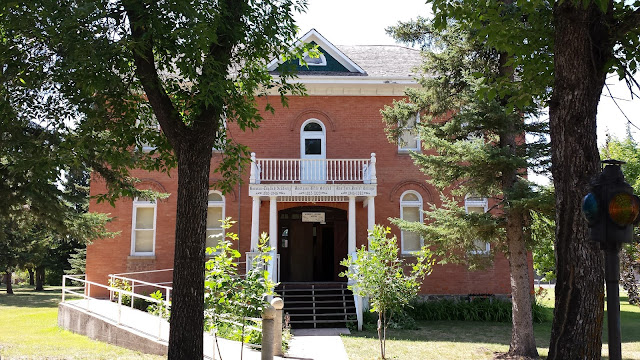P Squared and KG, an RJC Story.
Let me take you back today to the
winter/spring of 1949 and to Rosthern Junior College. It’s a kind
of “golden age” in the life of the school. Kornelius G. Toews
(KG), had been principal for over a decade as had the popular teacher
Peter P. Rempel (P-squared).
Both KG and P2 immigrated to
Canada in the 1920s, both were products of the surge in educational
excellence in Russian Mennonite Colonies in the 30+ years since most
of the Valley Mennonites had settled here. Both were graduates of the
German-English Academy that would become Rosthern Junior College (and
now, RJC High School) as well as of the University of Saskatchewan
where Toews earned a BA, a B.Ed and an MA and Rempel a BA and a B.Ed.
Both were loved by students of the time and molded distinguished
careers after leaving the GEA.
(Rounding out the staff were David
Paetkau, arguably the father of musical excellence among Valley
Mennonites, and J.G. Rempel, Bible teacher who became Elder of the
Rosenort Mennonitengemeinde during his tenure at the GEA.)
But in 1949, the constituency through
the RJC Board (of which Eigenheim minister, H.T. Klaassen was chair
at the time) was at odds with the style and contents of P.P. Rempel’s
teaching. He was apparently acquainting students with the rudiments
of Darwin’s Theory of Evolution as well as cosmological conceptions
of the origins of the universe. His defense was that he wasn’t
indoctrinating students into beliefs at odds with Genesis, but that a
rounded education required that they be familiar with what was being
posited in the world around them.
Turns out, his “liberal arts
education” bent was also evident in his teaching of Literature and
in his style—he would sit on his desk and chat . . . far too
informal an approach when viewed from the outside.
Despite a petition by students and
personal appeals, the board decided that Rempel would have to go. I
expect the judgment that the constituency division on the matter
could only be quelled with termination of the teacher was key
. . .
and that the constituency and board would still be there long after the
protesting students had gone.
But “the Lord giveth and the Lord
taketh away” is a maxim that has raised many a sigh. In a year or
two, the entire staff had turned over and although replaced by
competent teachers, the fact that the entire staff had been members
of the Mennonite Church in the area no longer pertained.
Also, in
Rempel, Paetkau and Toews, a talent pool of no considerable weight
was sacrificed. This, at least, is one way of looking at it.
In its defense, this turmoil happened
at a time when theological upheaval was apparent in every church and
church institution. Whereas the definition of “a Christian” had
been tied to church membership, baptism and piety, the “born
again,” individualistic concept of salvation was strengthening and
both leadership and constituents were somewhat “one foot on the
dock and the other in the canoe.”
I remember that my parents would
take us to Brunk Brothers tent revivals, but the nature of the
commitment urged there was never spoken of in the car on the way
there or the way back; their embarrassment over broaching the “born
again” subject with children was probably, in part at least, a lack
of the vocabulary that characterized such a theology.
But going back to the Rempel firing,
the crux of the matter persists to the present day. How liberal can a
curriculum be before the Bible and tradition lose their authority?
And in the splintered Mennonite world, whose tradition and whose
Bible interpretation shall prevail?
Biblically, we’re told that
it’s not what a person hears, sees or reads that defiles, but
rather what he/she says, shows, does or writes (Matthew 15:11). Since
our actions emanate from “our heart,” how does a Christian school
educate “the mind” without spoiling “the heart?” I’m sure
the constituency of RJC at the time had this as their major concern;
can we tolerate any teaching about evolution and cosmology given the
risk that students may embrace a worldview that rejects the Genesis
accounts?
Extrapolate from this to all those other burning
controversies like military service, abortion, sexuality and gender, dying with dignity,
drug use, wealth, sex outside of marriage, etc., etc. and it’s
pretty clear that a teacher in a parochial school is expected to be
much more than a presenter of a prescribed curriculum.
For me, the answer is simple and
clear. Accept that the Genesis accounts are allegories depicting the
awakening of human consciousness, and they dovetail quite nicely with
Darwinian Evolution. But then, I’d probably be fired for saying so
in most Christian parochial schools of today.
Browse again through the Forties
chapter of Roots and Wings: 100 years of Rosthern Junior College
and you’ll probably come away
with the impression that the students loved P2
for reasons other than those at which the constituency took offense.
He was amiable, knowledgeable, patient, generous, approachable . . .
and fun. I think he was exactly the kind of teacher under which
students tend to blossom.
You can be good for the heart while being
good for the mind.
Sometimes
we zig mightily where history tells us we should have zagged.




Comments
Post a Comment